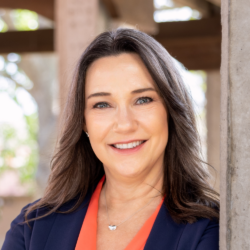Authentic Presence & Digital Doubles: Navigating Synthetic Media in Equitable Online Teaching
A CVC@ONE Community of Practice
As synthetic media tools become more available, instructors are exploring how AI-generated videos and voice clones may enhance their online teaching presence. But in an era where equity gaps persist, how do we harness these emerging technologies while preserving the authentic human connections that drive student success?
Join your California Community College colleagues in this Community of Practice to critically examine the opportunities and challenges of teaching with synthetic media. Through identity-conscious, collaborative dialogue and shared experimentation, we'll explore questions like:
- How can synthetic media support instructor presence while maintaining authenticity and trust?
- What role does human imperfection play in creating inclusive learning environments?
- How might the use of AI-generated video and voice clones impact our relationships with students and, in turn, their success?
- What ethical considerations should guide our use of synthetic media in community college teaching?
Together, we'll apply the CCC Human-Centered Principles for Adopting Generative AI as we develop frameworks for intentional integration of synthetic media that prioritize human connection, support equity, and honor the unique value of authentic instructor presence in the online learning experience.
Outcomes
By the completion of the CoP, participants will be able to:
- Use Generative AI video tools to create instructional videos that complement their human presence and relationships with students;
- Discuss the positive influence of instructor-student relationships on psychological safety and the academic success of minoritized students;
- Identify a position on the ethical use of synthetic media in online teaching and learning.
Expectations of CoP Members
Member presence and participation is what fuels a Community of Practice (CoP). Research shows CoPs effectively support growth in new teaching practices, as well as teacher confidence by building self-efficacy through collaborative learning. In a CoP, power is distributed amongst participants, who actively contribute ideas, questions, and diverse perspectives to support the group’s collective learning. Ensuring you are available to attend and engage in the CoP meeting is paramount. Participants are also expected to bring a critical lens to this work by actively examining one’s privileges and biases, listening with empathy, and leaning in to one’s vulnerability as we experiment with different technologies.
Who is Eligible to Participate?
This professional development opportunity is provided by CVC@ONE and is free of cost. To be eligible, you must meet the following criteria:
- Currently employed as a CCC faculty (part-time/full-time) or instructional support staff. Priority will be given to those who are in a teaching role;
- Possess basic video skills (recording, hosting, editing, captioning);
- Be available to attend all sessions;
- Be willing to spend 1-2 hours between sessions on activities;
- Be willing to create at least one external (free) account to use for the experimentation of synthetic media. This involves providing a video of yourself to train the AI and creating a bot that will generate synthetic videos and voice narrations.
Spring 2025 Meeting Dates
CoP members will participate in six 90-minute Zoom sessions on the following dates/times:
- Thursday, February 13 10:00-11:30 am PT
- Thursday, February 27 10:00-11:30 am PT
- Thursday, March 13 10:00-11:30 am PT
- Thursday, March 27 10:00-11:30 am PT
- Thursday, April 10 10:00-11:30 am PT
- Thursday, April 24 10:00-11:30 am PT

Your Community of Practice Guide:
Michelle Pacansky-Brock, Ed.D.
Faculty Member, CVC@ONE
This CoP will be facilitated by Michelle Pacansky-Brock, CVC@ONE faculty mentor. Michelle is a practitioner, leader, and scholar of humanized online teaching and learning and the author of Best Practices for Teaching with Emerging Technologies.
Have Questions?
Feel free to reach out to support@cvc.edu. We’re here to help!

